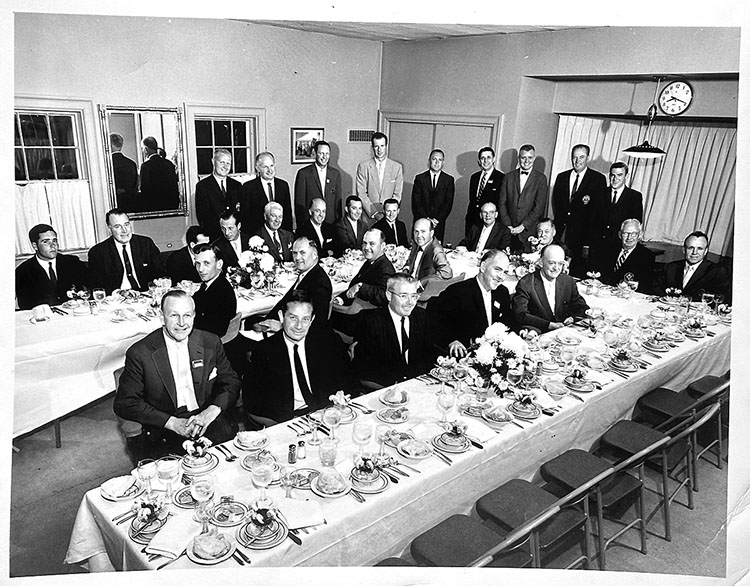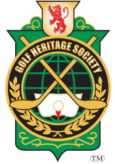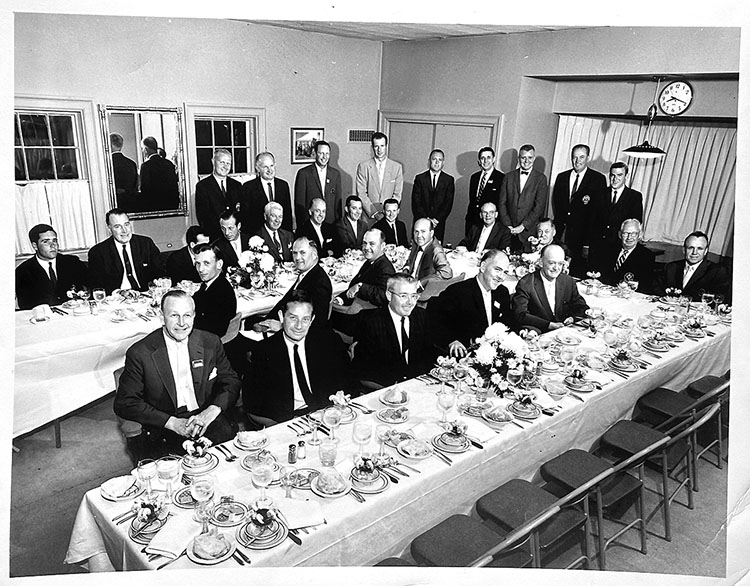
By John Fischer III
Anyone who follows the Masters golf tournament has probably heard of the Champions Dinner held on Tuesday evening of the tournament week. The idea came from Ben Hogan in 1952 who sought permission to hold a dinner for all prior winners of the Masters. The group would constitute The Masters Club. Augusta National Golf Club Chairman, Clifford Roberts, and club President, Bob Jones, co-founders of the Masters, were included in the dinner.
Around this time of year there is interest in the menu, which is selected by the defending champion. This year, Scottie Scheffler makes the decision, although attendees can select something else from the club’s outstanding kitchen if the menu isn’t to their taste. The defending champion gets the dinner bill for all invitees, a tradition started by Ben Hogan, albeit when there were fewer living past champions.
But the Champions Dinner isn’t the first such event to be held in connection with the Masters. Back in 1947, Charlie Yates, a prominent amateur golfer having won the NCAA Championship, the Western Amateur and the British Amateur, and low amateur in the inaugural Masters, suggested to Bob Jones that the club host a dinner for the amateurs who were invited to the Masters as contestants.
Charlie’s idea was to make the amateurs feel wanted, especially playing in a tournament with top professionals. Charlie wanted them to relax, enjoy themselves and get to know each other better. The idea was to have a “pep rally.” Bob Jones took to the idea immediately and the first Amateur Dinner was held in the following year, 1948.
At the first Amateur Dinner, there were eight amateurs in the field, nine if you counted Bob Jones, but Jones played as “Bob Jones,” neither amateur nor professional, although Jones made instructional movies and designed clubs for Spalding, and would be regarded as having lost his amateur status. Except this was Bob Jones’ tournament so he could designate himself, well, as just himself, Bob Jones. Coincidentally, 1948 was the last year Jones played in the Masters. He suffered from syringomyelia, a degenerative disease which would eventually take his life.
Skee Rigel, the 1947 U.S. Amateur Champion, was low amateur in the 1948 Masters, and would later turn professional. Bob Rosberg, who would also turn professional, played the tour and then become a well-respected television golf personality, participated in the 1948 Masters as an amateur. And Skee wasn’t presented the dinner bill as happens in the Champions Dinner. The club selects the menu and picks up the tab.
The club doesn’t release the names of invitees to the Amateur Dinner, or how they’re selected, other than those who are actually playing in the Masters that year, although past U.S. Amateur Champions are invited, as are other well-respected amateurs or golf administrators.
Over the years the dinner became a way for life-long amateurs to gather, meet the up-and-coming amateurs, catch up with each other and reminisce about old times.
Some idea of invitees can be gleaned from photos of the event which occasionally appear in magazines and books or on the Masters website.
Originally, the master of ceremonies was Charlie Yates, a great speaker and a man with a lot of riveting golf stories, many of which included events with which he’d been involved. It was one of Bob Jones’ favorite parts of the Masters. He was the best, and most famous, amateur golfer of all time, and he loved to get together with other amateurs, and always spoke at the Amateur Dinners, told a few tales and frequently offered some advice on how to play the course which he’d helped to design.
After a while, his disease forced Jones to walk with the assistance of two canes which were specially made of hickory for him by T.W. Minton & Co. of Barbourville, Ky., which had supplied hickory shafts for him over his competitive years. Jones later was confined to a wheelchair. At his last appearance at the Masters in 1969, Jones was in very poor physical condition, and asked Yates not to call on him for a few comments at the end of the Amateur Dinner, but as he was winding up, Yates felt a tug on his jacket. It was Jones, who loved the Amateur Dinner and what it represented, and with great difficulty he got to his feet saying, “I just want to say a few words….” It’s unfortunate that those “few words” weren’t recorded.
Traditions carry on at the Masters. This year the amateur contestants are Sam Bennett, U.S. Amateur Champion; Ben Carr, U.S. Amateur runner-up; Harrison Crowe, Asia-Pacific Amateur Champion; Mateo Fernandez de Oliveira, Latin America Amateur Champion; Matthew McClean, U.S. Mid-Amateur Champion; and Aldrich Potgieter, British Amateur Champion. These seven amateur contestants were invited by virtue of the named amateur tournaments where they were winner or runner-up.
Additionally, Gordon Sargent, the Division 1 NCAA individual champion, received a special invitation to this year’s Masters. The club has made it clear that the NCAA Champion will not receive an automatic invitation to the Masters, although the press has speculated for years on that possibility.
These amateurs will be the guests of honor at the Amateur Dinner which will be presided over by Fred Ridley, the Chairman of the Augusta National Golf Club, himself a winner of the U.S. Amateur Championship in 1975. Ridley is the last U.S. Amateur Champion never to have turned professional. He also played in the Masters from 1976-1978.
Other speakers at the Amateur Dinner this year will include the Captain of the R&A, President of the USGA, a former amateur participant and a current amateur contestant.
The dinner will be held in the Founders Room, a relatively new addition to the club facilities which overlooks the Butler Cabin where television interviews are held. In addition to the amateur contestants, other invitees, many of them Augusta members, will bring the number of attendees to 60 or more. The club does not release their names nor the reasons they are invited.
It is probably fair to note that there are very few lifetime amateurs today like Bill Campbell, Charlie Coe, Billy Joe Patton, Dale Morey or Chuck Kocsis who could play at the top level of the game against a professional field. In past years, they would have been invitees to the Amateur Dinner. In 1954, when Patton finished third in the Masters, just missing a playoff with Sam Snead and Ben Hogan by one stroke, there were 22 amateurs in the Masters field.
The low amateur who makes the cut receives a silver bowl and the low amateur runner-up, who must also make the cut, receives a silver medal.
But being one of the few amateurs in the Masters field doesn’t relegate one to a life of golf oblivion after the Masters. Low amateur winners include the following who went on to win the Masters after turning professional, and it’s a pretty snappy list: Cary Middlecoff; Jack Nicklaus; Ben Crenshaw; Phil Mickelson; Tiger Woods; Sergio Garcia; and Hideki Matsuyama.
So, this year, keep an eye open on the amateurs in the field, and watch for what they accomplish in future years.

